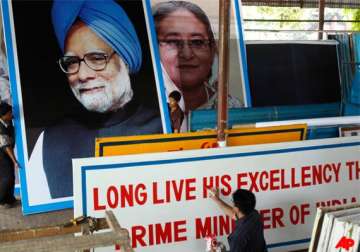PM Arrives On Two-Day Bangladesh Visit
Dhaka, Sept 6 : Prime Minister Manmohan Singh today arrived here on a two-day visit to Bangladesh that is expected to put the bumpy bilateral ties in a new trajectory through signing of deals in
Dhaka, Sept 6 : Prime Minister Manmohan Singh today arrived here on a two-day visit to Bangladesh that is expected to put the bumpy bilateral ties in a new trajectory through signing of deals in a range of sectors including extradition of sentenced persons, connectivity, power, exchange of enclaves and border management.
However, the visit has been clouded by the uncertainty over the signing of an accord on sharing of waters of Teesta River following strong reservations expressed by West Bengal Chief Minister Mamata Banerjee who pulled out of the visit. Diplomatic sources said the two countries are also considering signing of a long-term framework agreement for forging close bilateral relations.
Bangladesh and India had signed a 25-year Treaty of Friendship, Cooperation and Peace on March 19, 1972. The two governments, however, declined to renegotiate or renew the treaty when it expired in 1997. The framework of agreement, the sources said, will provide a structure, and identify priorities of the relationship.
Singh had, in a statement on the eve of his departure for Dhaka, outlined his agenda in Bangladesh—security, boundary issues, water resources, power connectivity, improvement of border infrastructure, trade facilitation and economic cooperation-and said efforts would be made to sustain and build upon the “positive momentum”.
During his visit, Singh will hold talks with his Bangladesh counterpart Sheikh Hasina, call on President Zillur Rahman and hold meetings with opposition leaders Begum Khaleda Zia and Jatiya Party chief Hussain Muhammed Ershad, the former military dictator.
Agreements on land boundary, water resources, market access and power purchase are crucial for Bangladesh while transit and security are prime concerns of India.
Giving security cooperation a leg-up, an extradition pact is likely to be inked by the two sides in the presence of Singh and Hasina after their talks in Dhaka tomorrow. Top ULFA leader Anup Chetia, now in Bangladesh after having served out his sentence, could be the first to sent back to India under the new accord.
The two countries are likely to sign agreements, protocols, and memorandums of understanding (MoUs) on withdrawal of water from Feni River by India for a drinking water project and a 20-year agreement on purchase of 250 megawatt (MW) of power by Bangladesh from India at a preferential rate. Bangladesh might purchase another 250 MW power at the international market rate.
The two countries are likely to sign a package protocol under the 1974 Mujib-Indira Land Boundary Agreement which will deal with five legacy issues—exchange of enclaves and adversely possessed land, demarcation of 6.5 kms of un-demarcated border, allowing Bangladeshis to use “Tin Bigha Corridor” for 24 hours, and finalisation of a strip map. A likely MoU on trade liberalisation will allow duty-free entry of several of the 61 Bangladeshi products, most of them garments, to India. This will be signed under the Trade Agreement between the two countries.
The maiden bilateral visit by Singh-and the first by an Indian Prime Minister in 12 years—aims at consolidating the process set in motion during the landmark visit of Hasina to India in January, 2010, to craft a new paradigm relations, said Foreign Secretary Ranjan Mathai ahead of the visit. In a statement prior to his departure for Dhaka, the Prime Minister said India's partnership with Bangladesh was important for the stability and prosperity of northeastern states.
Significantly, Singh will be accompanied by chief ministers of four northeastern states-Assam, Tripura, Meghayala and Mizoram-in his trip to Dhaka. A protocol on Protection of Royal Bengal Tiger in the Sundarbans is also likely to be inked. Besides, the two countries might sign an MoU on Preservation of Biodiversity in the Sundarbans.
Bangladesh and India are also likely to sign MoUs on cooperation on renewable energy, telecast of programmes of Doordarshan and state-owned BTV, cooperation in fisheries sector and cooperation between Dhaka University and Jawaharlal Nehru University in New Delhi.
An accord on allowing transit to Nepal through Rohanpur (Chapai Nawabganj) in Bangladesh and Singabad in India might also be signed. There is also the possibility of signing of an agreement on railway connectivity between Akhaura and Agartala, alignment construction of which is nearing completion.
India's pressing issue of transit is expected to be signed under existing Trade Agreement between the two countries. Under it, three separate protocols on use of Chittagong and Mongla seaports of Bangladesh and roads and railway are on the cards.
Both the countries would make arrangements for the use of their waterways, roadways and railways for commerce between the two countries for passage of goods between mainland India to its northeastern states through Bangladeshi territory. PTI
